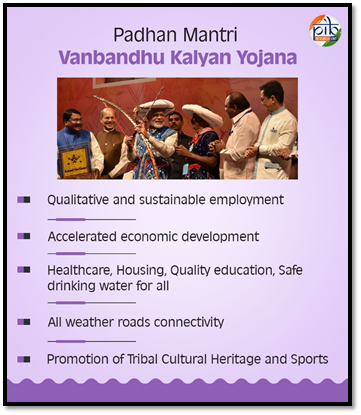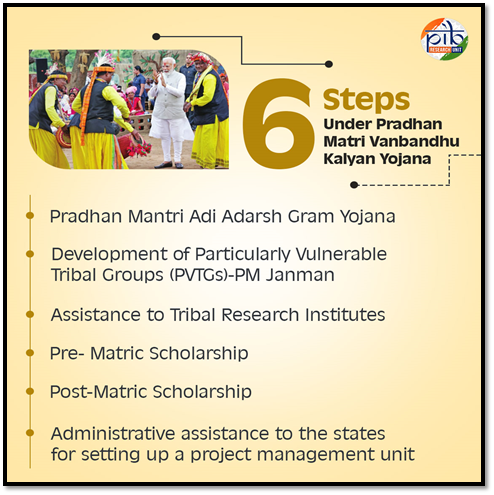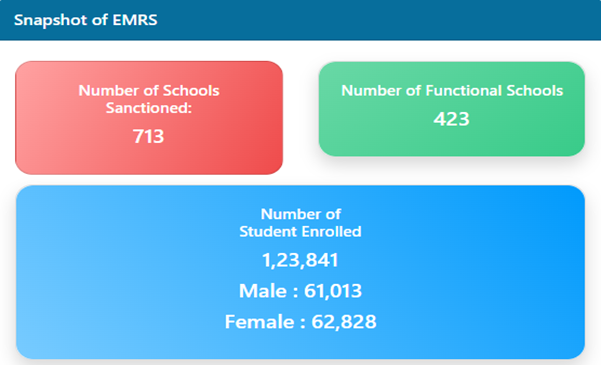Others
Pradhan Mantri Vanbandhu Kalyan Yojana
Empowering Tribal Communities in India
Posted On:
28 OCT 2024 5:28PM
“The government is putting in all its efforts to ensure that every scheme of the government reaches our most backward tribal brothers and sisters as soon as possible. No backward brother or sister of mine will now be left out of the benefits of the government’s scheme.”
Prime Minister, Narendra Modi
|
The Pradhan Mantri Vanbandhu Kalyan Yojana (PMVKY) is a landmark initiative that was launched on October 28, 2014. This ambitious scheme has been conceived as a comprehensive strategy to address the unique challenges faced by tribal communities in India, which constitute about 8.9% of the country's population. With over 700 scheduled tribes spread across diverse regions—from the Himalayas to the Andaman and Nicobar Islands—India's tribal populations often remain marginalized in terms of socio-economic development.

With the vision of inclusive development articulated by Prime Minister Shri Narendra Modi, the Pradhan Mantri Vanbandhu Kalyan Yojana (PMVKY) aims to empower tribal communities in India, recognizing their historical neglect. The initiative not only provides financial assistance but also establishes a framework for sustainable development. As the Prime Minister stated, "Our tribal communities have shown the way when it comes to living in harmony with nature and conserving our forests," highlighting the importance of their priorities. With a financial outlay of ₹26,135.46 crores from 2021-22 to 2025-26, PMVKY focuses on the holistic development of tribal communities through integrated village development and capacity-building initiatives in education and livelihoods. By fostering an environment where these communities can thrive, the government seeks to create a more equitable society that aligns with Modi's vision of "Sabka Saath, Sabka Vikas" (Together with all, Development for all). This initiative not only aims to improve the socio-economic conditions of tribal populations but also emphasizes the preservation of their cultural heritage and identity.
Six Key Steps Under PMVKY

The PMVKY encompasses six steps aimed at different facets of tribal welfare. These include:
Pradhan Mantri Adi Adarsh Gram Yojana
The Pradhan Mantri Adi Adarsh Gram Yojana (PMAAGY) revamps the existing Special Central Assistance to Tribal Sub-Plan, which focuses on integrated village development in 36,428 villages with significant tribal populations.[1] This initiative targets critical sectors such as road and telecom connectivity, education, health services, and sanitation, all of which aim to raise the living standards of tribal communities.
Under the scheme, these villages have been specifically identified to address challenges in road connectivity, mobile and internet access, schools, Anganwadi centres, health sub-centres, drinking water facilities, drainage, and solid waste management. Each village will receive ₹20.38 lakh, with a total expenditure of ₹7,276 crore planned by 2025-26. As of July 2024, schemes for approximately 16,000 villages have been approved, and ₹2,283 crore has already been released for implementation.
Development of Particularly Vulnerable Tribal Groups (PVTGs)
The PVTG development scheme is designed to ensure the socio-economic upliftment of the most marginalized tribal communities (PVTC families) while preserving their cultural heritage[2]. The initiative provides financial support to state governments for tailored developmental activities in housing, health, and education sectors. The Pradhan Mantri PVTG Development Mission has been launched to enhance further living conditions and provide PVTG families with access to basic facilities.
In the 2023-24 Budget Speech, the government announced the launch of a Pradhan Mantri PVTGs Development Mission to improve their socio-economic conditions, allocating Rs. 15,000 crore over three years for essential amenities like secure housing, clean drinking water, sanitation, education, health, nutrition, and enhanced connectivity. An initial comprehensive IEC campaign is underway in 100 districts, targeting around 500 blocks and 15,000 PVTGs habitations to raise awareness about their entitlements. The initiative will ensure that every unreached PVTGs household benefits from various government schemes, utilizing local centers like Haat Bazar, CSCs, and Gram Panchayats to facilitate access and services at their doorstep.
Support to Tribal Research Institutes (TRI)[3]
This component facilitates research and documentation efforts related to tribal communities. Financial assistance is allocated to state governments and UTs based on their proposals to strengthen the knowledge base concerning tribal cultures and challenges.
Pre-Matric Scholarships
These centrally sponsored schemes aim to support tribal students in their educational pursuits. The Pre-Matric Scholarship caters to students in grades IX and X, the scholarship is available for students with a parental income of up to ₹2.50 lakhs, ensuring that financial constraints do not hinder educational advancement.
For most states, the Government of India contributes 75%, while the state government provides 25%. In the case of North Eastern and hilly states, the Government of India’s contribution increases to 90%, with the state contributing only 10%. For Union Territories (UTs) like Andaman & Nicobar, which do not have a Legislative Assembly or their own grants, the Government of India provides 100% of the funding.
Post-Matric Scholarships
The Post-Matric Scholarship follows similar terms and conditions as the Pre-Matric scheme but caters to Scheduled Tribe students studying beyond class 10. This scholarship aims to further support their educational journey by alleviating financial burdens and encouraging continued academic advancement.
Administrative Assistance for Project Management Units
The PMVKY also allocates funds to establish project management units within state governments, ensuring that schemes related to the welfare of Scheduled Tribes are effectively monitored and implemented.
Other Steps by Government of India for Tribal Welfare
Eklavya Model Residential Schools
In addition to the above components, the Eklavya Model Residential Schools (EMRS) scheme has been established to provide quality education to Scheduled Tribe students from classes VI to XII. Under the new scheme, the Government decided to establish one EMRS in every block having more than 50% ST population and at least 20,000 tribal persons (as per census 2011). Accordingly, the target is to set up 728 EMRSs across the country by the year 2026.

*As on 1st Oct, 2024
Funding and Implementation Strategies
In the current financial year (2024-25), the central government has allocated ₹4,300 crore to support the six schemes under the PMVKY. This includes provisions to provide scholarships to 27.5 lakh students and improve basic amenities in 5,000 villages. The emphasis on tribal research institutes, multi-purpose centers, and project management units underscores the government's commitment to sustainable tribal development.
Pradhan Mantri Janjatiya Vikas Mission (PMJVM)
Approved for implementation from 2021-22 to 2025-26, the PMJVM has been restructured by merging and extending two existing schemes: the “Mechanism for Marketing of Minor Forest Produce through Minimum Support Price” and the “Institutional Support for Development and Marketing of Tribal Products.” The Pradhan Mantri Janjatiya Vikas Mission (PMJVM) is designed to enhance tribal entrepreneurship and create livelihood opportunities by promoting the efficient and equitable use of natural resources, including agricultural products, Non-Timber Forest Products (NTFPs), and non-farm enterprises. The Tribal Cooperative Marketing Development Federation of India (TRIFED) serves as the central implementing agency for this initiative.
The mission supports the theme of “Vocal for Local by Tribal,” aiming to empower tribal communities through local resource utilization. Under the PMJVM, the Ministry provides financial assistance for the procurement of Minor Forest Produces (MFPs) at Minimum Support Price (MSP), the development of infrastructure for MFP and non-MFP value chains, and value addition training programs through Van Dhan Vikas Kendras.
Development Action Plan for Scheduled Tribes (DAPST)
The Development Action Plan for Scheduled Tribes (DAPST) serves as a dedicated funding source for tribal development. This multi-faceted strategy encompasses support for critical areas such as education, health, sanitation, water supply, and livelihood opportunities.
In addition to the Ministry of Tribal Affairs (MoTA), 41 ministries and departments contribute a percentage of their total scheme budgets each year towards tribal development initiatives under the DAPST. This collaborative approach aims to address the diverse needs of tribal communities across sectors including education, health, agriculture, irrigation, roads, housing, electrification, employment generation, and skill development.
For the current financial year, these ministries and departments are implementing 214 schemes and programs under the DAPST, with an allocation exceeding ₹1.23 lakh crore. Of this, approximately ₹36,000 crore has already been released for various schemes and programs, underscoring the government's commitment to the development of Scheduled Castes and Tribal Areas.
Conclusion
The Pradhan Mantri Vanbandhu Kalyan Yojana represents a significant step towards the empowerment and inclusion of tribal communities in India’s development narrative. By providing targeted interventions across various sectors, the PMVKY aims to create a more equitable society where tribal populations can thrive and contribute to the nation’s progress. With the government’s sustained commitment to tribal welfare, the future looks promising for the diverse and resilient tribal communities of India.
References:
https://pib.gov.in/PressReleasePage.aspx?PRID=1943128#:~:text=Pradhan%20Mantri%20Vanbandhu%20KalyanYojana%20(PMVKY,26135.46%20crores&text=Ministry%20of%20Tribal%20Affairs%20is,and%20welfare%20of%20tribal%20communities.
https://newindiasamachar.pib.gov.in/WriteReadData/flipbook/2024/Oct/2nd/English/index.html
Press Release:Press Information Bureau
https://tribal.nic.in/EMRS.aspx
https://www.india.gov.in/spotlight/pradhan-mantri-janjati-adivasi-nyaya-maha-abhiyan-pm-janman
https://socialjustice.gov.in/public/ckeditor/upload/90101653029266.pdf
Pradhan Mantri Vanbandhu Kalyan Yojana
*******
Santosh Kumar/ Ritu Kataria/ Ishita Biswas
(Backgrounder ID: 153376)
Visitor Counter : 6817
Provide suggestions / comments